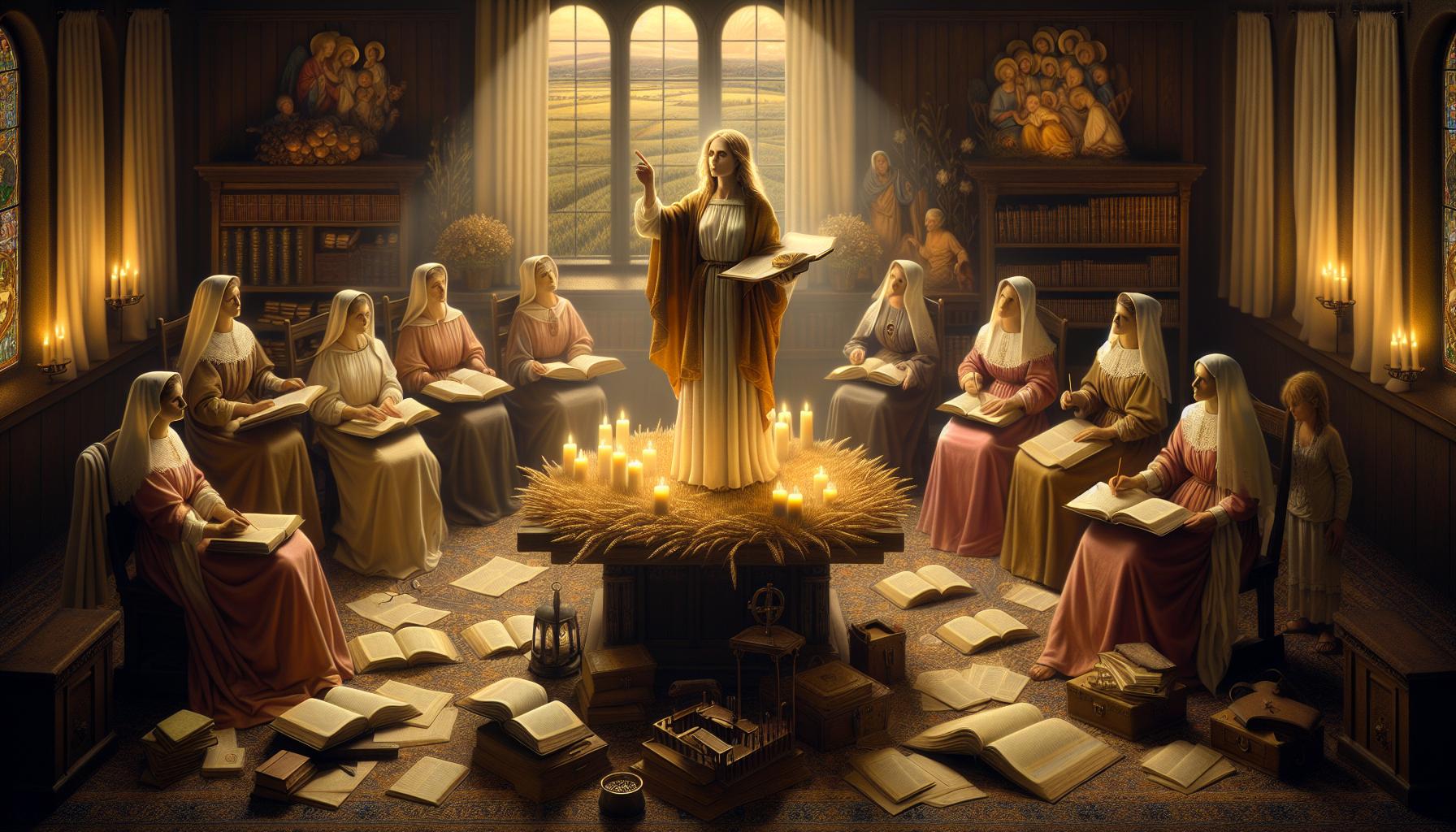Can women preach in church, or are scriptural interpretations limiting their voices? This question sparks ongoing debates among congregations and theologians alike. Understanding biblical perspectives on female preaching is crucial for fostering inclusive worship environments and addressing long-standing controversies, ultimately impacting the future of church leadership and community dynamics.
Understanding Biblical Context: Women in Ministry Roles
In examining the role of women in ministry within a biblical context, it is essential to recognize the profound influence that various scriptures have on this conversation. The Bible presents a complex narrative regarding women, one that can inspire both empowerment and controversy within the church. From the early church’s foundational figures to contemporary ministries, understanding these dynamics can clarify crucial questions about what it means for women to preach and lead in faith communities.
The Scriptural Foundations
Many debates related to women preaching stem from specific biblical passages, often quoted both in support and opposition to female leadership. Key scriptures include:
- Galatians 3:28: This verse emphasizes that in Christ, there is neither Jew nor Gentile, neither male nor female—signaling a radical equality that challenges traditional roles.
- 1 Timothy 2:12: Often cited to restrict women from teaching or having authority over men, this passage invites deeper theological reflection, especially regarding its cultural context.
- Acts 2:17-18: Following Pentecost, the promise of the Holy Spirit being poured out on all people (including women) demonstrates that the gift of prophecy and preaching extends beyond gender.
This brief overview underscores the necessity for a nuanced understanding of biblical context, recognizing that interpretation can often become polarized.
Real-World Examples of Women in Ministry
When considering the role of women in preaching, it is enlightening to look at historical and contemporary figures who have shaped this discussion.
| Name | Era | Significant Contribution |
|---|---|---|
| Junia | 1st Century | Recognized as “outstanding among the apostles” in Romans 16:7, highlighting early church leaders. |
| Phoebe | 1st Century | Served as a deaconess and is credited with delivering Paul’s letter to the Romans. |
| Joyce Meyer | Modern Era | A contemporary teacher and author, impacting millions with her ministries focused on empowerment and healing. |
| Beth Moore | Modern Era | A renowned speaker and author, advocating for women’s roles in preaching and teaching within churches. |
These women exemplify the breadth of contributions made by females within the church, offering a perspective that enriches the conversation about what the Bible truly says about woman preaching in church.
Engaging with Controversies
The dialogue surrounding women in ministry is often fraught with tension, as varying interpretations of scripture lead to divergent views. It’s critical that congregations engage with these controversies constructively. Here are some actionable steps for churches to take:
- Encourage open discussions: Create spaces for congregants to explore scriptural interpretations related to women’s roles, fostering a culture of understanding and respect.
- Offer educational resources: Provide books, studies, and workshops that delve into the historical context of women in the Bible and their relevance today.
- Highlight female leaders: Celebrate the contributions of women both in biblical texts and modern contexts, illustrating the importance of diversity in ministry.
Through these endeavors, faith communities can navigate the complexities of what the Bible says about woman preaching in church, creating an inclusive environment that reflects the heart of the gospel.
Key Scriptural Passages: What the Bible Says
What does Scripture really convey about the role of women in preaching? This question has been a point of contention among theologians, clergy, and congregations. Throughout biblical history, various passages have been interpreted to either support or challenge the idea of women preaching in church. To navigate this complex terrain, it’s essential to examine key scriptural passages that provide both clarity and context.
Key Biblical Passages
The New Testament presents several notable instances where women not only participated in ministry but also held significant leadership roles:
- Acts 2:17-18 – During Pentecost, Peter quotes the prophet Joel, declaring that in the last days, God’s Spirit will be poured out on all people, including sons and daughters who will prophesy. This indicates a divine endorsement of women actively participating in spiritual gifts, including preaching.
- Romans 16:1-2 – The Apostle Paul commends Phoebe, a deacon of the church in Cenchreae, for her role in the early church. Paul’s acknowledgment illustrates the recognition of women in positions of authority and teaching within the church.
- Acts 18:24-26 – Priscilla, alongside her husband Aquila, plays a pivotal role in teaching Apollos, an eloquent preacher, thereby influencing his understanding of the way of God. Their partnership signifies the important contributions of women in theological instruction.
- Galatians 3:28 – Paul states that in Christ, there is neither Jew nor Gentile, neither slave nor free, nor is there male and female, for all are one in Jesus Christ. This profound declaration emphasizes equality in spiritual standing and gifts.
These passages demonstrate the scriptural basis for women preaching in church, challenging traditional interpretations that restrict their roles. By examining these texts, congregations can foster a more inclusive understanding of ministry that aligns with the spirit of the Gospel.
In addition to these references, addressing the controversial verses that seemingly restrict women’s roles is equally important. For instance, 1 Timothy 2:11-12 is often cited to argue against female teaching. However, understanding the cultural context and the specific issues faced by the early church in Ephesus can provide a broader view of these instructions.
By thoughtfully considering both the supportive and restrictive passages, individuals and churches can engage in a constructive dialogue on the role of women in preaching, thus moving towards a clearer and more comprehensive approach to this crucial topic.
Historical Perspectives: The Evolution of Women’s Roles in the Church
Throughout history, the roles of women in the church have undergone significant transformations, each influenced by cultural, theological, and societal factors. Early Christianity presented an environment where women played crucial roles, from prominent leaders like Phoebe and Priscilla to the inclusion of female disciples. The question of what the Bible says about women preaching in church has spurred debates and led to reevaluations of these historical contributions, highlighting the complexities and nuances surrounding women’s leadership within the Christian faith.
Early Church Leadership
In the formative years of Christianity, women held substantial positions of leadership. They were not merely passive participants; instead, they were integral in the establishment of the early church. The New Testament references several prominent women involved in ministry, as seen in figures like:
- Phoebe: A deaconess in the church at Cenchreae, praised for her service and faith.
- Priscilla: Alongside her husband Aquila, she played an essential role in teaching Apollos, illustrating her involvement in theological education.
- Junia: Described as “outstanding among the apostles,” Junia’s mention in Romans 16:7 challenges the notion of women sidelined in church activities.
These examples lay the groundwork for understanding the early acceptance of women in leadership roles, challenging contemporary interpretations that restrict women’s participation based on a few specific biblical passages.
The Influence of Cultural Shifts
As Christianity spread, the societal expectations of women began to shift dramatically. By the second century, theological positions often reflected prevailing cultures that marginalized women’s roles. Traditional interpretations, influenced by patriarchal norms, led to a narrowing of women’s involvement in church activities, culminating in a general absence from leadership roles during the Middle Ages.
However, the Reformation in the 16th century sparked newfound discussions about individual interpretation of scripture and the role of believers, including women. Scholars and theologians began to reconsider what the Bible says about women preaching in church. This period opened doors for women to engage in devotional writings, teaching, and even leading congregations, a trend that set the stage for future movements.
Modern Perspectives and Ongoing Debates
Today, the landscape of women’s roles in the church is more diverse than ever. Many denominations have embraced women as pastors, bishops, and leaders, continuing to challenge traditional interpretations of scripture concerning preaching. However, the question persists: what does the Bible say about women preaching in church? This inquiry continues to fuel discussions among theologians, scholars, and congregants, fracturing some churches into progressive and conservative factions.
A significant aspect of this ongoing debate involves revisiting specific biblical texts often cited against women’s preaching. Analyzing these passages in context reveals a broader narrative of inclusivity and divine calling. Studies show that a growing number of Christians are supportive of women in ministry, reflecting a modern understanding of the gifts and callings bestowed upon all believers, regardless of gender.
In conclusion, examining the evolution of women’s roles in the church not only sheds light on historical injustices but also empowers contemporary faith communities to embrace a more inclusive understanding of leadership. Encouraging discussions about what the Bible says about women preaching in church can lead to richer, more diverse expressions of faith that honor both the scriptural foundation and the historical contributions of women in Christianity.
Theological Debates: Complementarianism vs. Egalitarianism
The discourse surrounding gender roles within the church is a complex and often contentious issue, central to the ongoing discussion about what the Bible says regarding women preaching in church. At the heart of this debate lie two contrasting theological frameworks: complementarianism and egalitarianism. Each perspective highlights different interpretations of scripture, particularly concerning leadership roles for men and women within the church community.
Understanding Complementarianism
Proponents of complementarianism argue that men and women have distinct roles designed by God, often leading to the belief that church authority should be reserved for men. This perspective is supported by biblical passages such as 1 Timothy 2:12, where Paul states that he does not permit a woman to teach or exercise authority over a man. Complementarians view this as not only a cultural statement for the time but as a universal principle reflecting God’s intended order for human relationships. They emphasize the importance of male leadership while affirming the significance of women’s contributions within their designated roles, leading to a structured approach to church operations.
Egalitarian Views
In stark contrast, egalitarianism advocates for equality in leadership roles, insisting that both men and women are equally called to serve and lead within the church. Proponents argue that scriptural evidence supports women’s preaching roles, citing examples like Deborah’s leadership in Judges 4-5 or Phoebe as a deacon in Romans 16:1. They highlight Galatians 3:28, which states that in Christ, there is neither male nor female, suggesting that all barriers to leadership based on gender should be dismantled. Egalitarians challenge traditional interpretations, arguing that cultural context must be considered, and that the early church often defied social norms, thereby opening pathways for women’s leadership historically and biblically.
Key Differences in Beliefs
| Aspect | Complementarianism | Egalitarianism |
|---|---|---|
| Role of Women | Distinct roles; women support men in church leadership | Equal roles; women can lead and preach |
| Scriptural Interpretation | Literal readings of select passages that favor male authority | Contextual readings emphasizing equality in Christ |
| Examples in the Bible | Focus on male leaders like the apostles | Cites women leaders like Deborah and Phoebe |
| Approach to Church Governance | Hierarchical structure | Flat or team-based leadership structure |
Both complementarianism and egalitarianism offer compelling arguments, creating a rich tapestry of beliefs that influence the modern church’s understanding of gender roles. As congregations grapple with these theological debates, it becomes crucial to approach the topic with prayerful consideration and an open dialogue grounded in Scripture. Whether the church leans towards one of these perspectives or finds a middle ground, the ultimate goal remains the same: to honor God and fulfill the calling of every believer within the community.
Practical Considerations: How to Honor Diverse Beliefs in Worship
Navigating the complexities of honoring diverse beliefs in worship settings requires sensitivity, respect, and open-mindedness, particularly when the topic involves contentious issues like women’s roles in preaching. As churches strive for inclusivity, understanding the myriad of interpretations within biblical texts can foster a richer and more harmonious worship experience. The ongoing discussions about what the Bible says about women preaching in church reveal more than theological debates—they highlight our collective journey toward understanding and acceptance.
Recognizing Varied Perspectives
When addressing diverse beliefs, it is crucial to recognize that congregants come from a range of backgrounds and interpretations. Here are some practical ways to create an inclusive worship environment:
- Foster Open Dialogue: Encourage discussions that allow congregants to express their thoughts and feelings about women in leadership. Consider scheduling forums or workshops to facilitate these conversations.
- Host Diverse Speakers: Invite speakers from various theological perspectives to share their insight, helping to illuminate different interpretations of scripture related to women in ministry.
- Promote Educational Resources: Provide access to literature and materials that explore various viewpoints, allowing congregants to engage with the topic at their own pace.
Creating Inclusive Worship Practices
Incorporating diverse beliefs into the fabric of worship can also be accomplished through thoughtful practices. For example, consider the following strategies:
- Diverse Liturgical Practices: Design liturgies that reflect different theological interpretations and incorporate voices from various traditions. This might include prayers, scripture readings, or hymns that celebrate both male and female leaders.
- Recognizing Key Contributions: Acknowledge women’s contributions in ministry during services. This recognition can shift perceptions and demonstrate the church’s commitment to inclusivity.
- Continued Education: Offering ongoing theological education can empower both men and women in your congregation to explore the scriptural basis for women’s roles in ministry, thus bridging gaps in understanding.
Real-World Application: Case Studies
Consider how various congregations have successfully navigated these discussions. One notable example is a multi-denominational church that took the initiative to explore the question of women’s leadership in ministry through a sermon series titled “Voices of Faith.” This series featured testimonies from female leaders and theological discussions that invited congregants to explore biblical texts in context. As a result, the church not only deepened its communal understanding of women’s roles but also fostered an environment of mutual respect and exploration.
| Practice | Description | Outcome |
|---|---|---|
| Open Forums | Regular discussions allowing congregants to voice their thoughts on women’s leadership. | Increased understanding and reduced polarizing views. |
| Diverse Speaker Series | Inviting various theological leaders to share insights on women’s roles in church. | Expanded perspectives and enhanced community engagement. |
| Liturgical Diversity | Incorporating different prayers and readings that reflect various beliefs. | Greater sense of belonging among attendees. |
By deliberately crafting worship experiences that honor diverse beliefs surrounding what the Bible says about women preaching in church, communities can cultivate an atmosphere of love, understanding, and spiritual growth. In doing so, they not only adhere to the core tenets of their faith but also reflect the broader, inclusive nature of the church universal.
Empowering Voices: Women Who Have Shaped Preaching Today
Throughout history, the landscape of preaching has been shaped by a growing chorus of female voices, each contributing to a nuanced conversation about gender, authority, and faith. Today, as more women step into the pulpit, they challenge long-standing interpretations and cultural norms surrounding what the Bible says about women preaching in church. This essential dialogue not only highlights the theological underpinnings of women’s roles in ministry but also empowers a new generation of leaders to embrace their call to preach.
Trailblazers in Ministry
The contributions of pioneering women in ministry cannot be overstated. Figures like Barbara Brown Taylor and Nadia Bolz-Weber have redefined the preaching landscape through their innovative and inclusive approaches. Their ability to intertwine personal narrative with scripture has resonated deeply with congregations seeking authenticity and relevance. Here are some notable individuals who have made significant impacts:
- Joyce Meyer: Known for her practical and empowering teachings, she has reached millions through her conferences and broadcasts.
- Christine Caine: Founder of A21, she emphasizes freedom and justice, using her platform to advocate for the oppressed.
- Priscilla Shirer: A prominent speaker and author, she skillfully teaches Biblical truths and encourages women to step into their roles as leaders.
Theological Insights
Examining what the Bible says about women preaching in church has sparked various interpretations, often leading to heated debates. A closer look at key scriptures reveals a complexity that reflects cultural contexts and theological understandings:
| Reference | Description | Interpretation |
|---|---|---|
| 1 Timothy 2:12 | Paul’s instruction on women teaching or having authority over men. | Contextual interpretations vary; some view it as a cultural restriction, while others see it as a timeless principle. |
| Acts 2:17-18 | The prophecy of daughters and young men speaking visions. | This suggests inclusivity in God’s calling, empowering women to preach. |
| Romans 16:1-2 | Paul endorses Phoebe as a deacon and a leader. | Recognizes women in leadership roles in the early church. |
Encouraging the Next Generation
As various denominations reassess their stances on women in preaching, the importance of mentorship and development cannot be overlooked. Women leaders can take actionable steps to mentor aspiring preachers:
- Host workshops that focus on biblical interpretation and public speaking skills.
- Create platforms for young women to share their sermons in safe environments.
- Engage in one-on-one mentoring that emphasizes both theological education and practical ministry experience.
By harnessing the richness of female perspectives in preaching, the church continues to navigate the complexities surrounding women’s roles, echoing the enduring question: What does the Bible say about women preaching in church? The evolving conversations not only honor past contributions but also illuminate a transformative future.
Navigating Church Traditions: Challenges and Opportunities for Women
Navigating the landscape of church traditions can often feel like walking a tightrope for women seeking active roles in ministry. Many congregations still grapple with the implications of biblical passages regarding women’s preaching, leading to a complex interplay of challenges and opportunities. The question of what the Bible says about women preaching in church remains a point of contention, giving rise to various interpretations that shape how women navigate their spiritual journeys within these communities.
Challenges Faced by Women in Church Leadership
Despite the clear biblical evidence of women in leadership roles, such as Phoebe, Priscilla, and Junia, many women encounter barriers when seeking to fulfill their call to preach or lead. Some of the most significant challenges include:
- Traditional Beliefs: Many denominations adhere to orthodox interpretations that restrict women from assuming pastoral roles. This often leaves aspiring female leaders questioning their call and abilities.
- Institutional Structures: Church hierarchies can be male-dominated, resulting in a lack of mentorship and support for women. This can stifle opportunities for growth and visibility.
- Social Expectations: Cultural norms and societal pressures often dictate what roles are deemed acceptable for women, further complicating the conversations around women in ministry.
Opportunities for Empowerment and Growth
While challenges abound, there are also significant opportunities for women to explore their calling within church traditions. Some of these include:
- Community Support: Many churches actively promote mentorship programs and support groups that empower women to pursue their leadership goals.
- Expanded Roles: Progressive denominations are increasingly recognizing the contributions of women, allowing for enhanced participation in preaching, teaching, and leadership.
- Educational Resources: With the rise of online theological education and women’s seminars, more women are equipped to engage in theological discourse, providing them with the tools necessary to address and challenge traditional views.
Real-world initiatives showcase these evolving dynamics. For example, congregations that implement inclusive policies often see a greater engagement from their female members, enhancing community spirit and outreach. By addressing the question of what does the Bible say about women preaching in church, these communities foster environments where women are not only allowed but empowered to preach the Word boldly, enriching the spiritual lives of their congregations.
It’s essential for women to remain persistent and proactive in their growth, seeking out educational resources, forming networks, and advocating for their rights within church frameworks. Through this engagement, they can both navigate the complexities of tradition and carve out a space for their unique contributions to ministry.
A Path Forward: Building Inclusive Communities of Faith
The ongoing discussion surrounding women’s roles in the church highlights a transformative movement toward inclusivity within faith communities. As congregations grapple with the question of what the Bible says about women preaching, it becomes evident that this dialogue can pave the way for effective change. Many biblical figures exemplify strong, influential women whose voices and leadership were vital to the early church, urging contemporary believers to reflect on how these examples can invigorate modern faith practices.
Embracing Leadership Roles
Faith communities can benefit significantly by embracing women in leadership positions. This shift not only aligns with scriptural precedent but also fosters more diverse and inclusive environments. Consider the following steps faith leaders can take to cultivate inclusivity:
- Educational workshops: Organize sessions that explore scriptural interpretations regarding women in ministry, allowing various perspectives to be shared.
- Mentorship programs: Establish mentoring relationships where experienced female leaders can guide and support emerging voices, thus building a robust pipeline of leadership.
- Inclusive preaching opportunities: Create platforms for women to share their messages during services, recognizing that diverse voices enrich the congregation’s spiritual life.
Engaging the Community
To facilitate a genuine path forward, it is essential for faith communities to actively engage their congregations in conversations about inclusivity. This can be achieved through:
- Discussion groups: Form small groups to discuss relevant scripture, encouraging open dialogue about women’s roles in preaching.
- Guest speakers: Invite female leaders from various denominations to share their experiences and insights, helping to demystify misconceptions.
- Feedback mechanisms: Implement anonymous surveys to gauge congregational sentiments on women in ministry, allowing for data-driven decision-making.
By implementing these strategies, churches can create environments where all members feel valued and empowered. This approach not only aligns with the scriptural foundations but also resonates with the contemporary desire for inclusivity within faith settings. Embracing women’s voices is not merely about addressing controversies but about strengthening the community of faith by fostering a more holistic representation of the body of Christ. Through thoughtful engagement and commitment to inclusivity, faith communities can build a brighter and more united future.
Q&A
What Does the Bible Say About Woman Preaching in Church?
In the Bible, women’s roles in church leadership, including preaching, are subjects of discussion and debate. Passages like 1 Timothy 2:12 and 1 Corinthians 14:34-35 raise questions, while examples like Deborah in Judges and Phoebe in Romans highlight women’s active ministry roles.
Many churches interpret these scriptures differently. Some underscore the cultural context of these passages, suggesting that restrictions may not apply universally. Others believe these verses are prescriptive for all time. Understanding these different perspectives can help individuals explore their beliefs. For a deeper look, see our article on women in church leadership.
Why Does the Bible Discuss Women Teaching in Church?
The Bible discusses women teaching to address their roles in the early church, promoting order and authority. Verses outlining expectations are necessary for maintaining community dynamics and spiritual edification.
When exploring what does the Bible say about woman preaching in church, it’s essential to consider the historical and cultural context of the time. The early church faced various challenges, including false teachings, which may have influenced these guidelines. Understanding this context can provide insight into modern applications.
Can I Support Women Preaching in Church Based on the Bible?
Yes, many people find biblical support for women preaching in church through various examples and interpretations. Notable women leaders and teachers in the Bible suggest that women’s voices are valuable in ministry.
Instances of women like Priscilla, who taught Apollos in Acts 18, or Junia, noted as an apostle in Romans 16:7, illustrate that the early church valued women’s contributions. Additionally, some modern denominations embrace women’s preaching by interpreting scriptures through lenses of equity and spiritual gifting.
What Are Some Controversies Regarding Women Preaching?
Controversies around women preaching often arise from differing interpretations of scripture and church tradition. Many argue over the applicability of Pauline epistles compared to the lives of women leaders in the Bible.
Debates also concern the purpose of these texts—whether they were meant to be culturally specific or universally applicable. These ongoing discussions reflect larger questions about authority, gender roles, and the evolving nature of church practice in today’s world.
How Do Different Denominations View Women Preaching?
Denominations vary widely in their views on women preaching, influenced by their interpretations of scripture and tradition. Some denominations fully embrace women in leadership, while others maintain restrictions.
For example, denominations like the United Methodist Church support women in pastoral roles, allowing them to preach and lead. In contrast, more conservative groups, such as some Baptist circles, may limit teaching roles solely to men based on specific scriptural interpretations.
What is the Historical Context of Women in Church Ministry?
The historical context of women in church ministry is complex, reflecting cultural norms and theological developments. Throughout the Bible, women played crucial roles, yet societal views often constrained their involvement.
This dynamic continued into church history, where women contributed significantly in various capacities but often faced pushback. The reformation and subsequent movements saw a resurgence in female leadership and preaching, suggesting a biblical precedent for ongoing dialogue in the church today.
How Can Churches Implement Women’s Preaching Today?
Churches can implement women’s preaching by creating environments that support and encourage female leaders. This includes providing opportunities for preaching and teaching while actively working against cultural biases.
Training programs and mentorship can help women develop their gifts. Moreover, fostering discussions within congregations about scripture and women’s roles can lead to a more inclusive approach, welcoming diverse perspectives regarding church leadership and preaching.
Insights and Conclusions
As we conclude our exploration of what the Bible says about women preaching in the church, we have navigated the complexities of scriptural interpretations and the diverse traditions that shape this vital conversation. From examining key passages and the cultural context of early church practices to understanding contemporary applications, it is clear that the role of women in preaching is both a profound and nuanced topic.
We have seen how various theological perspectives can enrich our understanding, and we encourage you to reflect on how these insights resonate within your own faith community. As you continue to seek clarity amidst the controversies, remember that every denomination brings its unique heritage and interpretation to this important dialogue.
We invite you to delve deeper into the discussions surrounding this subject. Whether through prayer, study, or engaging conversations with fellow believers, may you find wisdom and encouragement in your journey. Together, let’s foster an inclusive environment that honors the diverse voices within the church while embracing the call to serve and share the Gospel. Your role in this dialogue is valuable, and we look forward to hearing your thoughts and experiences as you reflect on the contributions of women in ministry.






